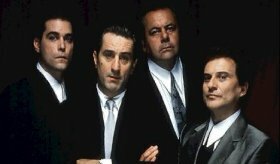|
|
| Tookey's Review |
|
| Pro Reviews |
|
| Mixed Reviews |
|
| Anti Reviews |
|
| Cast |
|
| |
 |
| |
| Released: |
1990 |
| |
|
| Genre: |
DRAMA
CRIME
THRILLER
BIOPIC
CONTROVERSIAL
|
| |
|
| Origin: |
US |
| |
|
| Length: |
146 |
|
| |
|
| |
|
|
| |
|
30 years in the career of real-life gangster Henry Hill (Ray Liotta), who descends into a self-made hell and the FBI's witness protection programme, accompanied by his wife (Lorraine Bracco), a nice Jewish girl seduced by wealth and the glamour of gangsterism.
|
Reviewed by Chris Tookey
|
|
|
| The trouble with most gangster movies, from Public Enemy to The Godfather , is that, even though the film-makers dutifully ensure that their anti-heroes meet a nasty end, they usually glamorize the lifestyle, loyalty and competence of the criminal fraternity so much that any final come-uppance fails to outweigh the gangsters' overall attractiveness. Scorsese avoids this trap by constantly revealing the skull behind the smile.Seldom has violence has been portrayed less glamorously, or with more moral effectiveness. Whether it's the slaying of a dying, defenceless rival in a car boot, or the shooting of a harmless waiter, there's never any doubt that violence is repellent: the work of inadequate, scared men. |
| And yet, Scorsese's anti-heroes make us care. Dangerous psychopath though Joe Pesci's character is, we are still shocked when he himself is gunned down. We sense Lorraine Bracco's fear of De Niro. We feel Liotta's panic when the FBI is on to him. We even share De Niro's sense of betrayal when Liotta testifies against him. All this is a tribute to some magnificent acting, but also to Scorsese's direction, which constantly changes our viewpoint with consummate ease. |
| Technically, too, Scorsese manages some startling effects: there is one masterly steadicam shot, as Liotta leads the woman he is trying to impress (Bracco) into a nightclub by a side entrance. Another tour de force is the scene in a diner where Liotta realizes that De Niro is out to kill him, and the back-projection enlarges subliminally, to give the effect of Liotta's world closing in. Every shot shows a director at the height of his powers, with the entire vocabulary of film at his fingertips. |
| But the main reason why this is more than just another study of the Mafia is that Scorsese depicts criminality as being a temptation for all of us. His portrayal of Ms Bracco's seduction, in particular, is a memorable study of how anyone might be enticed into criminality. Some critics objected that there was little depth or complexity in Scorsese's characterisation; but in doing so they missed the point. In other movies, such as Raging Bull and Taxi Driver , Scorsese chose to investigate an individual's psychology. In this film, he is doing something different: portraying a whole society of people who lack depth, who simply don't see any problem with what they're doing. |
| Good Fellas is full of detailed observation, humour and realism; but it's also a parable, a reminder that Scorsese once intended to become a priest. It's a sustained attack not only on gangsterism, but also on the three big, post-Marxist "isms": opportunism, conformism and materialism. It's timely, horrible and devastating, the greatest of all gangster movies. Thelma Schoonmaker's editing was nominated for an Oscar; it remains a mystery as to why Michael Ballhaus's cinematography was ignored, and even more unfathomable is the reasoning as to why Scorsese wasn't even nominated for Best Director. |
|
|
|
|
